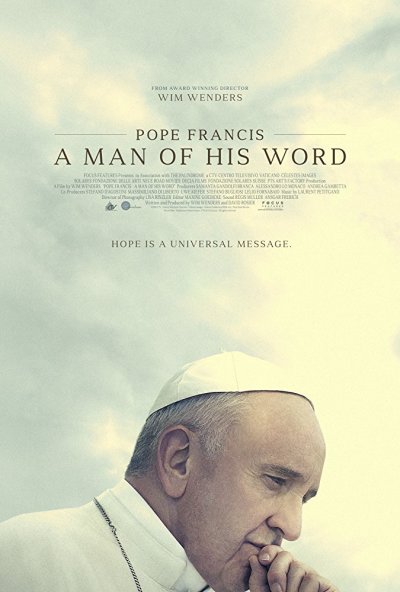The Politically Correct Vision of 'Pope Francis: A Man of His Word'

"Pope Francis: A Man of His Word" is a documentary depicting the worldview of Pope Francis on a number of social, spiritual and political issues. Rather than telling Pope Francis's life story, the documentary takes a philosophical and sometimes political approach.
Director Wim Wenders, a self-professed Christian, starts off by asking some questions about how human beings should spend their lives. Using footage from around the world, Wenders mentions a litany of mankind's ills, including wars, violence, terrorism, environmental destruction, and poverty. He says Earth will soon have eight billion people in it, with one billion destined to be in dire poverty.
This statistic is false. The number of people "living in extreme poverty" has been decreasing for the last three decades. Also, according to the United Nations Food and Agriculture Organization, the number of hungry people in the world has fallen from about 1.011 billion people in 1990-1992 to 794.6 million in 2012–2014. That doesn't stop Pope Francis, however, from talking about world poverty as if it were growing.
One of the misleading leftist canards the movie repeats is that 20% of the people in the world own 80% of the world's wealth.
In the first place, capitalism tends to reduce the amount of poverty in a country. Not only has there been a reduction in poverty in the last three decades, but poverty also has been declining since the beginning of the Industrial Revolution, spurred by the advent of capitalism in Great Britain, the United States, Europe, then Asia and elsewhere. In contrast, socialist policies can increase both poverty and income inequality. For example, studies have shown that minimum wage laws reduce the number of jobs and reduce people's income because businesses under not only replace people with machines but also reduce the hours their employees work. The destruction of Venezuela's capitalist economy because of utopian socialist mismanagement is just the latest in a long string of socialist failures.
Also, the specific people in the 20% the Pope mentions change over time. Economist Thomas Sowell noted, that after 15 years over 95% of people who start out in the bottom 20% rise out of it and more have reached the top 20% than remain in the bottom 20%. Sowell added that about 10 to 12 percent of the world's people live in mountain regions, where production is difficult, leading to high levels of poverty. Poverty is particularly common in Sub-Sahara Africa partly because geography—the Sahara Desert and the lack of natural sea ports—make interaction with the rest of the world more difficult, thus limiting trade and capital investment. Finally, Sowell noted, wealth can depend on cultural and demographic differences. Younger populations, like that of many African and Latin American countries, tend, because they've had less time to gain productive experience, to be poorer than older ones, like that of Japan.
Pope Francis and Wenders also talk about the evils of human pollution and human-caused climate change. They and their documentary support the Paris accord on climate change, which President Donald Trump decided to abandon.
Wenders claims that species are going extinct at an accelerating rate because of human pollution and human-caused climate change. However, this claim has been disputed by some experts, who are worried about environmental science losing credibility.
Wenders also shows images of human pollution and waste, such as a large landfill where poor people pick through tons of garbage, or masses of plastic waste in the ocean, as if these were a common occurrence. He follows these sad images with an urgent plea by Pope Francis for the world's people to stop consuming and wasting so much stuff. Accumulation of plastic in our oceans is a valid concern, butenvironmentalists tend to exaggerate it far out of proportion to reality. Modern landfills greatly lessen wastes' negative impact on the environment, and engineers are discovering more and more ways to reuse rather than dispose of materials. As Cornwall Alliance for the Stewardship of Creation National Spokesman E. Calvin Beisner points out in his chapter refuting the clam that "Capitalism is Bad for the Environment" in the book Counting the Cost: Christian Perspectives on Capitalism, capitalist countries, like the United States, have far better environmental records than socialist countries, like the old Soviet Union.
There are some good things in "Pope Francis: A Man of His Word." For example, the Pope promotes the importance of family and the value of a hard day's work. However, the documentary is marred by empty, politically correct, socialist, radical environmentalist, even simply false claims.





















